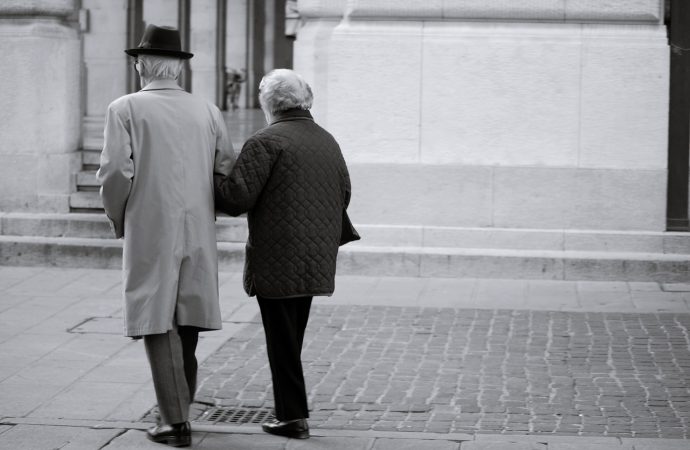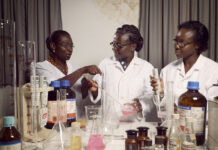A long life is an impressive achievement, but it is also a frightening prospect

In this interview for UA Magazine, Prof. Rudi Westendorp discusses the challenges of providing people better end-of-life care, the way societies look after their elderly, and what can we learn about old age by looking at big data.
UA Magazine: You started your career as a consultant in Internal Medicine and Critical Care, and it was only later you focused on elderly care. Do you see it as a 180º turn in your professional trajectory or do you think studying ageing was a logical step after your experience as a consultant?
Dr Rudi Westendorp: For most people, it came to as a surprise; at the time, my colleagues were astonished. Two factors made my brisk move almost intuitive. First, while working as a consultant in the Critical Care department, I dealt with a lot of older people. The reason is simple. Young and healthy people are unlikely to end up at critical care, apart from some exceptions, such as accidents.
Second, in Critical Care, I had to deal with life AND death. When working in that environment, I quickly realised that I couldn’t save everybody who had become diseased. As a medical doctor, I had to accept that ultimately I would fail. It is not to say that at the end of life, even when the end is emerging, doctors cannot make a contribution. But these insights help understand why my move into old age medicine is less strange than generally thought.
In your book, Growing Older Without Feeling Old (Scribe, 2015), you write “Our bodies are essentially the same as they always were. Our greatly increased longevity is the emphatic result of the enormous changes we have made to our environment”. Do you think we, in the 21st century, are reversing those changes? I am, specifically, thinking about climate change and the diseases and disasters that come with it.
Our increased longevity is the net benefit of an organised society where the risk of disease and disaster has been constrained. There is a continuous improvement of the environment and, at the flip side, we see a constant increase in human lifespans.
But human longevity is also threatened by misbehaviours. Getting rid of the habit of smoking, for example, brought us extra years in good health. When we replace this healthy behaviour by poor behaviours like overeating and a sedentary lifestyle, we are on the way back.
It is not the individual to blame but how we have organised our society, making it more difficult to refrain from the fast-food stands at every corner of the street or to cycle instead of taking the car. In a similar vein, peace and a well-functioning public administration are crucial steps in reaching a healthy old age. War or natural disasters can destroy longevity in a little time.
Activist Ashton Applewhite says that ageism (discrimination based on age) is unique because, unlike racism or sexism, we target our future selves. We have been, as she puts it, complicit in our own marginalization. Where does that prejudice against older people come from? Are we any better at taking care of older people than we were decades ago when our life spans were significantly shorter?
I think there must be a deep, routed, explanation for ageism other than self-enrichment or just blunt ignorance. From an evolutionary reasoning, it is the number of offspring, your genetic legacy, that matters. Life, of which humans are just an example of, is successful when it has an intrinsic program that invests in fitness, or else it just goes extinct.
If we combine this idea with the principle of economics, the struggle of distributing means when resources are limited, we can ask whether it makes sense to invest in old age when the progeny has reached sexual maturity. The answer is no. Investments in a good old age do not contribute to the number or outcome of the offspring and, thus, are irrelevant from an evolutionary perspective. It is even cruel for us to grow older.
This points to the blueprint of our bodies. We are not built for the long term, but for now, ready to have sex. That is why after the age of 40, when the kids get out of the house, a derailment of all bodily systems sets in, presenting itself in limitations, disease and disabilities.
Our brains are also optimised for fitness. We like to partner, have sex, want to start a family and feel proud when the little ones flourish. Investing in offspring is deeply ingrained in our behaviour. At that point, it doesn’t make sense to worry about old-age, from an evolutionary point of view.
It is a fact that we usually like kids but we do not instinctively care about older people. This is reflected in cultural patterns – rites of passage – where older people are neglected when conditions are harsh and means are insufficient to keep everybody alive.
Under nowadays conditions, we have the means to invest in all generations without direct costs at our fitness. But the hard wiring of our brains is not different from the generations before us. Therefore, only culture can make a difference in how we overcome ageism. It is not without reason that all “great” books mention that you have to take care of your parents. Otherwise, they are too easily forgotten.
As individuals, we have to adjust our expectations about life expectancy and live with the ambiguous feeling you describe in your book – that of wanting to remain healthier for a long time but not wanting to get old. As a society, how do we adjust to the longer life spans of individuals? Besides pensions and elderly care, what structural changes must we take to ensure we take good care of older people?
As reaching an old age is not an exception any more – not a certainty but very much likely- we have to reorganise the society in which we live. Two major challenges arise on the horizon. The first is the deep routed ageism that leads to neglect and insufficient investments in the later stages of life. This not only holds for society but also for the individual. A clear example is that surveys show again and again that young and middle-aged workers do not prepare for their pensions.
The second challenge is to cope with bodily, psychological and emotional challenges. Growing old gracefully is hard work! The most important thing is that individuals and societies invest in old age. How you do it is a less relevant topic, it is a matter of choice. Every person and culture have their own priorities and have to make the investments accordingly.
Countries, like individuals, differ a lot in their attitudes towards ageing. You said recently in an interview that Denmark has two advantages to study ageing: on a societal level, there is a rich collection of citizen data and, at the individual level, a mindset to work towards a collective goal. How is that different from other countries you know or lived in, for instance, the Netherlands?
The main difference between Denmark and the Netherlands is how people operate, privately and professionally. Both foster their society and the cultural environment in which they live, but whereas the Dutch operate as individuals, the Danes operate in groups, which demands transparency and trust between its members. That is why there is so much data available on the life courses of the Danes and the country has a legal construct on how to make use of these data to the benefit of all. It is a goldmine for researches like me. It enables us to study the life histories of millions of individuals, how they become mature, how they age and what biological societal and cultural determinants are important.
We discuss this type of research with the lay public. Why? Because by law they enabled us to do so, provided us with the means to execute this research, and want to be informed about the progress that we are making. In spring 2019, we have held a conference for researches and laypeople alike. The exit polls showed that half of the visitors felt more confident in the research that we are doing.
You have recently been awarded a grant, financed by Novo Nordisk Fonden, to create the CHALLENGE platform and study the relationship between ageing and disease. One component of this project is the analysis of tissue samples collected in Denmark since the 1960s. What kind of information are you looking for in these tissues and what will they reveal about ageing patterns?
The research program has several topics of interest. Amongst others, we want to understand the mechanisms of disease that typically occur at old age, for instance, heart failure and dementia. Another topic of interest is prognosis, more broadly phrased as answering the question of what the future will bring, health-wise. This is of great importance for medical professionals to align their therapies, and for individuals to decide.
We also study the significance of the environment in which you live. Are you growing up in a clean or in a polluted environment? Within our research, a pollutant is broadly interpreted. It is not only air pollution but also the influence of light, stress, or the built environment that prevent you from physical exercise.
Finally, we have a great interest in understanding why complex systems fail. It mirrors the experience of going to a service station with your worn-out car. When the mechanic opens the lid, he looks grim and tells you it is a ‘difficult’ problem. He means that there is no easy fix. And that is what the biology of ageing is about. The rattling of our bodies and the disabilities, that’s what we’ve to cope with. Ageing is a wicked problem. There is not only one cause, and there is no silver bullet to solve it.
Because of the dimension of the project, you will work with a multidisciplinary team. Which groups of professionals will be involved in this project?
Because ageing is a complex problem, we need a variety of expertise and disciplines to better understand its mechanisms and shape the innovations that make us age more healthily. We need medics and psychologists who can define and describe physical and cognitive derailments. We need the basic scientists and physiologists who can decipher the molecular damages that give rise to the impairments of cells and tissues.
Without statisticians and computer analysts, we will not be able to analyse the unprecedented amount of information and to make sensible interpretations. Finally, there is a need for sociologists and innovators to transform new knowledge into personal, societal and technical interventions to make ageing better.
It is not easy to get everybody aligned as, in general, there is an emphasis on specialisation, simple problems and competition. That being said, for many, healthy ageing is an intriguing quest and a worthwhile goal to pursue.
Professor Rudi Westendorp works in the Centre for Healthy Ageing, at the University of Copenhagen, since 2015. His most recent project, the CHALLENGE platform, will lead him to study the ageing and disease using big data from Danish patients.
Professor Westendorp began his career as a consultant in internal medicine and critical care in 1990, after having received his Doctorate of Medicine from the Leiden University in the Netherlands. The move from consultancy in critical care to researching ageing was “almost intuitive”, he told us.
Read more about his work here.
References:
Westendorp, R. (2015). Growing older without feeling old: On vitality and ageing. Scribe Publications.





